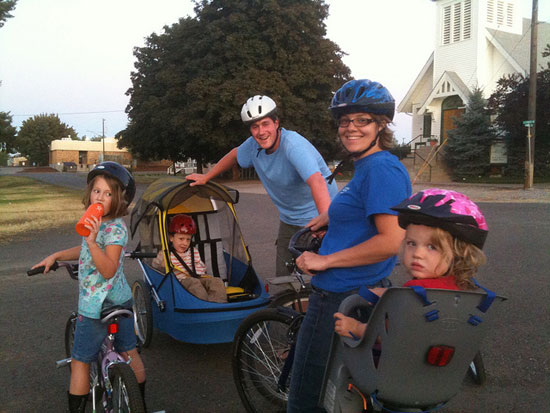Editor's note: We recently asked Emily to write this post for us, discussing the importance of specialized services. You can also read Joe Strechay's thoughts on specialized employment services here.
Simply walk into your average classroom, pre-school through high school, and you will immediately be aware of how much learning is processed visually. The obvious examples are posters on the wall. They're often not just for fun, but provide "hints" for students to remember their ABC's or even mathematical operations. These "hints" cannot be accessed by our kids with visual impairments.
Beyond posters there are libraries of books and textbooks that are inaccessible to our kids. There are movies and websites not readily available to our kids. There are hand signals and facial expressions the teachers use throughout the day... that will not benefit our kids. There are students rolling their eyes at each other, making eyes at each other, or simply making faces at each other... and our kids cannot participate.
That is, they cannot participate instinctually... but they can be taught. Sadly, they cannot be taught by simply any teacher, as most teachers were trained to have a classroom of sighted students. However, they can be taught by teachers of the visually impaired and orientation and mobility specialists.
We hear all the time about government cutbacks and the lack of money in education. Specialized services are always at risk. There simply aren't many children like mine, who are blind or visually impaired. So, sometimes, their needs are undervalued or simply not valued at all.
Should my son not be educated properly simply because his disability counts as "low incidence?" Should I be OK with him sitting in a corner of a classroom because all the educational materials are inappropriate for him... but they work for everyone else? Should I be resigned to the fact that he won't learn braille, because it's too specialized and there is no one to teach it? Basically, should I allow him to be illiterate? Um, I don’t think so.
From the moment my blind child was born, he wasn't the only one who needed specialized services. I did, too. Me... his own mother, needed to learn how to teach him. If I needed help, then surely educators do as well. If they aren't shown how to instruct our children, or given the guidance they need, there will be huge gaps in our kids' education.
What happens to our kids when they don't receive appropriate services, and their education is less than their peers? Well, our kids don't get jobs. Our kids cannot live independently. Our kids will have no travel skills, resulting in isolation. Our kids will suffer, and through their suffering... their parents, us, will suffer, too.
A teacher of the visually impaired showed me how to play with my blind infant. She taught me the braille alphabet so I had something concrete to hold onto. She gave me my first braille books and offered to braille my favorite children's stories. These services couldn't be provided by any other specialists... and I would have been lost without them.
I look to those people in my life today to keep me grounded. They help me understand when my son isn't learning fast enough. They give me answers when all I have is questions. They fight for my son's needs when I'm too tired, and I feel like nobody understands blindness. They give my son a voice that I cannot always provide.
Nobody could convince me that my son doesn't need specialized services unique to blindness. I know better. Sadly, not all educators or politicians realize the importance of services for our kids, so we have to make them aware. We have to become educators, and we don't have to make it up as we go.
Luckily, we have organizations like AFB that will provide materials to help us when needed. Because of their efforts, and my efforts, my son will learn how to use a cane. My son will learn to read braille. My son will be as independent as he can possibly be. He will learn these things because I'll make sure he has services he needs... specialized services unique to blindness.
For more from Emily, subscribe to her blog on FamilyConnect or follow her on Twitter at @emsuecoleman.
